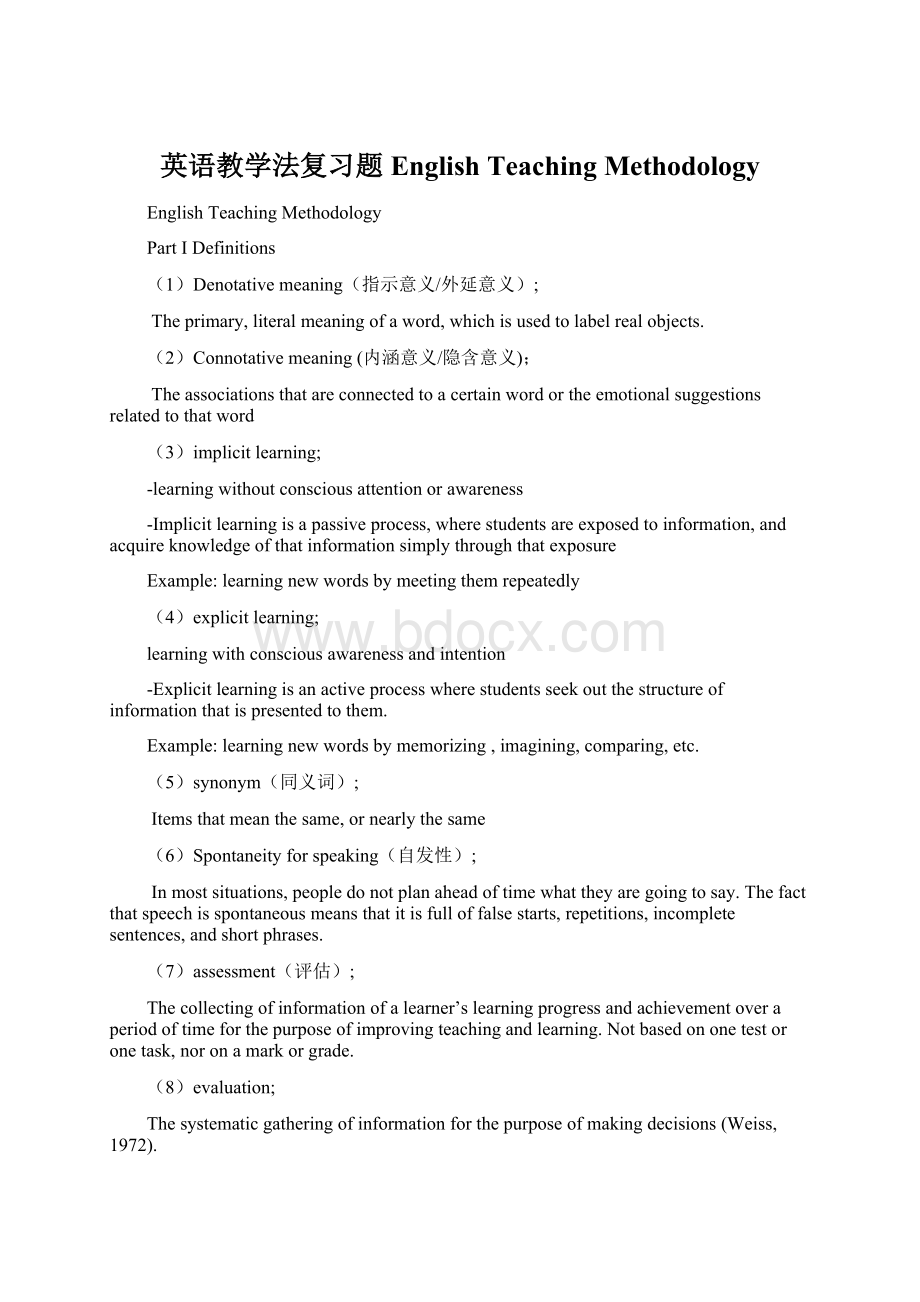英语教学法复习题English Teaching Methodology.docx
《英语教学法复习题English Teaching Methodology.docx》由会员分享,可在线阅读,更多相关《英语教学法复习题English Teaching Methodology.docx(28页珍藏版)》请在冰豆网上搜索。

英语教学法复习题EnglishTeachingMethodology
EnglishTeachingMethodology
PartIDefinitions
(1)Denotativemeaning(指示意义/外延意义);
Theprimary,literalmeaningofaword,whichisusedtolabelrealobjects.
(2)Connotativemeaning(内涵意义/隐含意义);
Theassociationsthatareconnectedtoacertainwordortheemotionalsuggestionsrelatedtothatword
(3)implicitlearning;
-learningwithoutconsciousattentionorawareness
-Implicitlearningisapassiveprocess,wherestudentsareexposedtoinformation,andacquireknowledgeofthatinformationsimplythroughthatexposure
Example:
learningnewwordsbymeetingthemrepeatedly
(4)explicitlearning;
learningwithconsciousawarenessandintention
-Explicitlearningisanactiveprocesswherestudentsseekoutthestructureofinformationthatispresentedtothem.
Example:
learningnewwordsbymemorizing,imagining,comparing,etc.
(5)synonym(同义词);
Itemsthatmeanthesame,ornearlythesame
(6)Spontaneityforspeaking(自发性);
Inmostsituations,peopledonotplanaheadoftimewhattheyaregoingtosay.Thefactthatspeechisspontaneousmeansthatitisfulloffalsestarts,repetitions,incompletesentences,andshortphrases.
(7)assessment(评估);
Thecollectingofinformationofalearner’slearningprogressandachievementoveraperiodoftimeforthepurposeofimprovingteachingandlearning.Notbasedononetestoronetask,noronamarkorgrade.
(8)evaluation;
Thesystematicgatheringofinformationforthepurposeofmakingdecisions(Weiss,1972).
(9)validity(有效正确);
Theextenttowhichinferencesmadefromassessmentresultsareappropriate,meaningful,andusefulintermsofthepurposeoftheassessment.Atestmeasureswhatitissupposedtomeasure.
(10)reliability;
Theextenttowhichtheresultscanbeconsideredconsistent(一致的)orstable.
Atestisreliableifitgivesthesameresultswhenitisgivenondifferentoccasionsorwhenitisusedbydifferentpeople.
(12)Washback(反驳作用);
Theeffectthattestshaveonlearningandteaching.Itcanbebeneficial(positive)ordetrimental(negative).
(13)Portfolios(学习档案袋);
Apurposefulcollectionofstudents’workthatdemonstratestostudentsandotherstheirefforts,progress,andachievementsingivenareasoveraperiodoftime(Genesee&Upshur,1996).
(14)linguisticcompetence(语言能力).
Linguisticcompetenceisthesystemoflinguisticknowledgepossessedbynativespeakersofalanguage.Itisincontrasttotheconceptoflinguisticperformance,thewaythelanguagesystemisusedincommunication.
PartIIShort-answerquestionsandDiscussions.
1.GivethedifferencesbetweenBritishEnglishandAmericanEnglish.
AmericanEnglishisevolvedfromBritishEnglish.Butthedifferencesbetweenthemarenoticeable.
Thedifferencesbetweenthem:
①.Vocabulary
a.PastSimple/PastParticiples
b.Prepositions
②Pronunciation
(1)[æ]—[ɑ:
]:
(2)[ɑ:
]—[ɔ]:
(3) [il]-[l]
(4)[u:
]—[ju:
]:
(5)[i:
]—[ai]:
(6)thesameword
③.Spelling(suffix)拼写(后缀)
④.Grammar语法
(1)Useofpresentperfecttenseandsimplepasttense.现在完成式和一般过去式
(2)Verbagreementandcollectivenouns主谓一致和集合名词
(3)Pasttenseforms.过去时态的形式
Firstofall,thedifferenceisvocabulary.Thefollowingverbshavetwoacceptableformsofthepastsimple/pastparticipleinbothAmericanandBritishEnglish,however,theirregularformisgenerallymorecommoninBritishEnglish(thefirstformofthetwo)andtheregularformismorecommontoAmericanEnglish.
(1)PastSimple/PastParticiples
⏹DreamdreamtORdreamed
⏹LeanleantORleaned
⏹LearnlearntORlearned
⏹SmellsmeltORsmelled
⏹SpellspeltORspelled
⏹SpillspiltORspilled
⏹BurnBurntORburned
(2)Prepositions
⏹AmericanEnglish-ontheweekend
BritishEnglish-attheweekend
⏹AmericanEnglish-onateam
BritishEnglish-inateam
⏹AmericanEnglish-pleasewritemesoon
BritishEnglish-pleasewritetomesoon
Secondary,thedifferenceispronunciation.Sometimesweusuallysoftenordon’treadthevowel(especiallythe[ə]or[i])intheunstressedsyllableoutinBritishEnglish,whileweshouldreadallvowelsoutintheAmericanEnglish.SoAmericansspeakmoreslowlyandclearlythantheBritishpeople.DifferencesinpronunciationbetweenAmericanEnglish(AmE)andBritishEnglish(BrE)canbedividedinto:
⏹Differencesinaccent(i.e.phonemeinventoryandrealisation).SeedifferencesbetweenGeneralAmericanandReceivedPronunciationforthestandardaccentsintheUnitedStatesandBritain;forinformationaboutotheraccentsseeregionalaccentsofEnglishspeakers.
⏹Differencesinthepronunciationofindividualwordsinthelexicon(i.e.phonemedistribution).Inthisarticle,transcriptionsuseReceivedPronunciation(RP)torepresentBrEandGeneralAmerican(GAm)andtorepresentAmE.
(1)[æ]—[ɑ:
]:
Whentheletter“a”comesbefore-s,-f,-th,-lf,-ph,-n,etc.wepronounce[æ]inAm.E,while[ɑ:
]inBr.E. 本论文由英语论文网提供整理,提供论文代写,英语论文代写,代写论文,代写英语论文,代写留学生论文,代写英文论文,留学生论文代写相关核心关键词搜索。
(2)[ɑ:
]—[ɔ]:
Whenthevowelletter“o”comesafterastressedclosedsyllableinaplosive,weusuallypronounceit[ɔ]inthestandardBr.E,while[ɑ:
]inAr.E.
(3) Wepronounce[il]or[l]inAr.Ewhile[ail]inBr.Ewhenthewordsendwith–ile.
(4)[u:
]—[ju:
]:
Americanspronounce[u:
]whileBritishpeople[ju:
]when“u”and“new”comeafter n-,d-,t-etc.
(5)[i:
]—[ai]:
Wepronouncethemonogram“ei”[i:
]inAm.Ewhile[ai:
]inBr.E.
(6)Eventhoughthesameword,therearesomepronunciationdifferencesinAm.EandBr.E.
Thirdly,thedifferenceisspelling.IntheUnitedStates’developmentoflanguage,spellinghaveoccurredinasimilarmovementofoursimplifiedcharacters(ThesimplifiedSpellingMovement),deletethewordspellinginsomeofthelettersarenotpronounced.
(1)Theaphonicsuffixsuchas-me,-ueintheEnglishwordsaredeletedintheAmericanspelling.
⏹Kilogrammekilogram
⏹programmeprogram
⏹cataloguecatalog
⏹dialoguedialog
⏹prologueprolog
(2)Thereare“our”attheendofthewordsandtheaphonicletter“u”isdeletedintheAmericanspelling.
⏹Behaviourbehavior
⏹colourcolor
⏹honourhonor
⏹labourlabor
(3)Thesuffix“re”whichisread[ə]become“er”.
⏹centrecenter
⏹fibrefiber
⏹metremeter
⏹theatretheater
(4)Thesuffix“ence”whichisread[ns]become“ense”.
⏹defencedefense
⏹offenceoffense
⏹licencelicense
⏹pretencepretense
(5)Thesuffix“ise”becomes”ize”.
⏹criticisecriticize
⏹organizeorganize
⏹realiserealize
⏹recogniserecognize
⏹standardisestandardize
(6)Double“L”intheBritishEnglishwordsbecomes“L”intheAmericanEnglishwords
⏹councilorcouncilor
⏹counsellorcounselor
⏹jewellerjeweler
⏹marvellousmarvelous
⏹parcelledparceled
⏹travellingtraveling
(7)Someoneelse.
⏹Chequecheck
⏹Gaoljail
⏹kerbcurb
⏹moustachemustache
⏹ploughplow
⏹pyjamaspajamas
⏹skepticalskeptical
⏹ erarerrubber
Fourthly,thedifferenceisgrammar.
(1)Useofpresentperfecttenseandsimplepasttense.
SpeakersofAmericanEnglishgenerallyusethepresentperfecttense(have/has+pastparticiple)farlessthanspeakersofBritishEnglish.InspokenAmericanEnglishitisverycommontousethesimplepasttenseasanalternativeinsituationswherethepresentperfectwouldusuallyhavebeenusedinBritishEnglish.
(2)Verbagreementwithcollectivenouns.InBritishEnglishcollectivenouns,(i.e.nounsreferringtoparticulargroupsofpeopleorthings),(e.g.staff,government,class,team)canbefollowedbyasingularorpluralverbdependingonwhetherthegroupisthoughtofasoneidea,orasmanyindividuals,e.g.:
Myteamiswinning.Theotherteamisallsittingdown.
InAmericanEnglishcollectivenounsarealwaysfollowedbyasingularverb,soanAmericanwouldusuallysay:
Whichteamislosing?
WhereasinBritishEnglishbothpluralandsingularformsoftheverbarepossible,asin:
Whichteamis/arelosing?
(3)Pasttenseforms.
BelowisatableshowingverbswhichhavedifferentsimplepastandpastparticipleformsinAmericanandBritishEnglish. Notethattheirregularpastformsburnt,dreamtandspoiltarepossibleinAmericanEnglish,butlesscommonthantheformsendingin-ed.
infinitive simplepast(Br) simplepast(Am) pastparticiple(Br) pastparticiple(Am)
burn burned/burnt burned/burnt burned/burnt burned/burnt
bust bust busted bust busted
dive dived dove/dived dived dived
dream dreamed/dreamt dreamed/dreamt dreamed/dreamt dreamed/dreamt
get got got got gotten
lean leaned/leant leaned leaned/leant leaned
learn learned/learnt learned learned/learnt learned
plead pleaded pleaded/pled pleaded pleaded/pled
prove proved proved proved proved/proven
saw sawed sawed sawn sawn/sawed
smell smelled/smelt smelled smelled/smelt smelled
2.ThecharacteristicsofAmericanEnglish
(1)ReservationoftheancientEnglishfeatures
Itretainsandrevivesmanyofthewordsinthathavealreadybecome"obsolete"inBritishEnglish,suchas
“Iguess“,“Ithink”,“Isuppose”,“Ibelieve”.Also,theAmericanEnglishhasreservdmanyvivid,imaginativeancientwords,suchas:
“fall”,meaning"autumn",derivingfrom“thefallofleaves(deciduousseason)”.
Inaddition,comparedwithLondonaccent,AmericanEnglishpronunciationisalittleold-fashionedwithsometypicalfeaturesoftheBritishEnglishinthe17thand18thcentury.Forexample,theretentionofretroflexR.
(2)Richcreativity
Createsomenewwordsthatdonotexistatall.
Instances:
pizzazz(时髦派头的人);blackhole(黑洞);spacewalk(太空行走);
Basedontheoldwords,itcreatenewwordsbyfreeuseofaffixes,orblending(andinversemethod